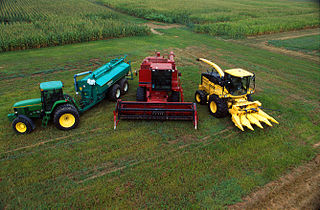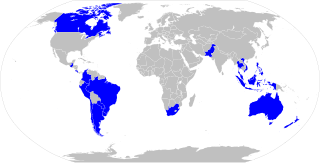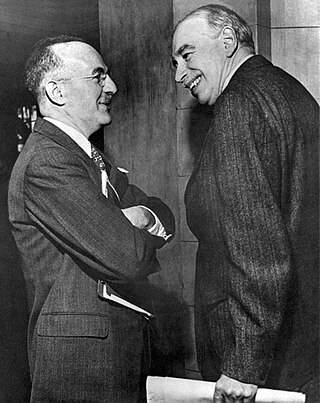The General Agreement on Tariffs and Trade (GATT) is a legal agreement between many countries, whose overall purpose was to promote international trade by reducing or eliminating trade barriers such as tariffs or quotas. According to its preamble, its purpose was the "substantial reduction of tariffs and other trade barriers and the elimination of preferences, on a reciprocal and mutually advantageous basis."

The World Trade Organization (WTO) is an intergovernmental organization headquartered in Geneva, Switzerland that regulates and facilitates international trade. Governments use the organization to establish, revise, and enforce the rules that govern international trade in cooperation with the United Nations System. The WTO is the world's largest international economic organization, with 164 member states representing over 98% of global trade and global GDP.

Agricultural policy describes a set of laws relating to domestic agriculture and imports of foreign agricultural products. Governments usually implement agricultural policies with the goal of achieving a specific outcome in the domestic agricultural product markets.

An agricultural subsidy is a government incentive paid to agribusinesses, agricultural organizations and farms to supplement their income, manage the supply of agricultural commodities, and influence the cost and supply of such commodities.

A cash crop, also called profit crop, is an agricultural crop which is grown to sell for profit. It is typically purchased by parties separate from a farm. The term is used to differentiate marketed crops from staple crop in subsistence agriculture, which are those fed to the producer's own livestock or grown as food for the producer's family.

The Cairns Group is an interest group of 19 agricultural exporting countries, composed of Argentina, Australia, Brazil, Canada, Chile, Colombia, Costa Rica, Guatemala, Indonesia, Malaysia, New Zealand, Pakistan, Paraguay, Peru, the Philippines, South Africa, Thailand, Ukraine, Uruguay, and Vietnam.

La Vía Campesina is an international farmers organization founded in 1993 in Mons, Belgium, formed by 182 organisations in 81 countries, and describing itself as "an international movement which coordinates peasant organizations of small and middle-scale producers, agricultural workers, rural women, and indigenous communities from Asia, Africa, America, and Europe".
The Uruguay Round was the 8th round of multilateral trade negotiations (MTN) conducted within the framework of the General Agreement on Tariffs and Trade (GATT), spanning from 1986 to 1993 and embracing 123 countries as "contracting parties". The Round led to the creation of the World Trade Organization, with GATT remaining as an integral part of the WTO agreements. The broad mandate of the Round had been to extend GATT trade rules to areas previously exempted as too difficult to liberalize and increasingly important new areas previously not included. The Round came into effect in 1995 with deadlines ending in 2000 under the administrative direction of the newly created World Trade Organization (WTO).

In agriculture and gardening, seed saving is the practice of saving seeds or other reproductive material from vegetables, grain, herbs, and flowers for use from year to year for annuals and nuts, tree fruits, and berries for perennials and trees. This is the traditional way farms and gardens were maintained for the last 12,000 years.
The Kennedy Round was the sixth session of General Agreement on Tariffs and Trade (GATT) multilateral trade negotiations held between 1964 and 1967 in Geneva, Switzerland. Congressional passage of the U.S. Trade Expansion Act in 1962 authorized the White House to conduct mutual tariff negotiations, ultimately leading to the Kennedy Round. Participation greatly increased over previous rounds. Sixty-six nations, representing 80% of world trade, attended the official opening on May 4, 1964, at the Palais des Nations. Despite several disagreements over details, the director general announced the round's success on May 15, 1967, and the final agreement was signed on June 30, 1967—the last day permitted under the Trade Expansion Act. The round was named after U.S. President John F. Kennedy, who was assassinated six months before the opening negotiations.

High-fructose corn syrup (HFCS), also known as glucose–fructose, isoglucose and glucose–fructose syrup, is a sweetener made from corn starch. As in the production of conventional corn syrup, the starch is broken down into glucose by enzymes. To make HFCS, the corn syrup is further processed by D-xylose isomerase to convert some of its glucose into fructose. HFCS was first marketed in the early 1970s by the Clinton Corn Processing Company, together with the Japanese Agency of Industrial Science and Technology, where the enzyme was discovered in 1965.
The International Trade Organization (ITO) was the proposed name for an international institution for the regulation of trade.
The Agreement on Agriculture (AoA) is an international treaty of the World Trade Organization. It was negotiated during the Uruguay Round of the General Agreement on Tariffs and Trade, and entered into force with the establishment of the WTO on 1 January 1995.
This is a timeline of the World Trade Organization (WTO).

Since its creation in 1995, the World Trade Organization (WTO) has worked to maintain and develop international trade. As one of the largest international economic organizations, it has strong influence and control over trading rules and agreements, and thus has the ability to affect a country's economy immensely. The WTO policies aim to balance tariffs and other forms of economic protection with a trade liberalization policy, and to "ensure that trade flows as smoothly, predictably and freely as possible". Indeed, the WTO claims that its actions "cut living costs and raise standards, stimulate economic growth and development, help countries develop, [and] give the weak a stronger voice." Statistically speaking, global trade has consistently grown between one and six percent per annum over the past decade, and US$38.8 billion were allocated to Aid for Trade in 2016.
The Ministerial Conference is the top decision making body of the World Trade Organization (WTO). There have been twelve ministerial conferences from 1996 to 2022, usually every two years.

The Corn Refiners Association (CRA) is a trade association based in Washington, D.C. It represents the corn refining industry in the United States. Corn refining encompasses the production of corn starch, corn oil, and high-fructose corn syrup (HFCS).

The World Trade Organization (WTO) is an intergovernmental organization which regulates international trade. The WTO officially commenced on 1 January 1995 under the Marrakesh Agreement, signed by 123 nations on 15 April 1994, replacing the General Agreement on Tariffs and Trade (GATT), which commenced in 1948. The WTO deals with regulation of trade between participating countries by providing a framework for negotiating trade agreements and a dispute resolution process aimed at enforcing participants' adherence to WTO agreements, which is signed by representatives of member governments and ratified by their parliaments. Most of the issues that the WTO focuses on derive from previous trade negotiations, especially from the Uruguay Round (1986–1994).

Sustainable Development Goal 2 aims to achieve "zero hunger". It is one of the 17 Sustainable Development Goals established by the United Nations in 2015. The official wording is: "End hunger, achieve food security and improved nutrition and promote sustainable agriculture". SDG 2 highlights the "complex inter-linkages between food security, nutrition, rural transformation and sustainable agriculture". According to the United Nations, there are around 690 million people who are hungry, which accounts for slightly less than 10 percent of the world population. One in every nine people goes to bed hungry each night, including 20 million people currently at risk of famine in South Sudan, Somalia, Yemen and Nigeria.

Biopiracy is the unauthorized appropriation of knowledge and genetic resources of farming and indigenous communities by individuals or institutions seeking exclusive monopoly control through patents or intellectual property. While bioprospecting is the act of exploring natural resources for undiscovered chemical compounds with medicinal or anti-microbial properties, commercial success from bioprospecting leads to the company's attempt at protecting their intellectual property rights on indigenous medicinal plants, seeds, genetic resources, and traditional medicines.













